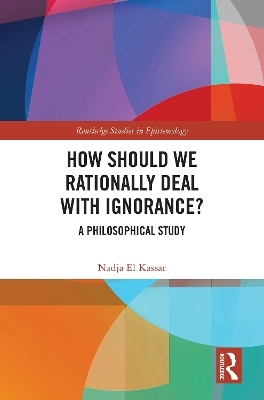
How Should We Rationally Deal with Ignorance?
Routledge (Verlag)
978-1-032-45121-3 (ISBN)
In the first part of the book, the author shows that epistemological definitions of ignorance are quite heterogeneous and often address different phenomena under the label "ignorance." She then develops an integrated conception of ignorance that recognizes doxastic, attitudinal, and structural constituents of ignorance. Based on this new conception, she carves out suggestions for dealing with ignorance from the history of philosophy that have largely been overlooked: virtue-theoretic approaches based on Aristotle and Socrates, consequentialist approaches derived from James, and deontological approaches based on Locke, Clifford, and Kant. None of these approaches individually provide a satisfying approach to the task of rationally dealing with ignorance, and so the author develops an alternative maxim-based answer that extends Kant’s maxims of the sensus communis to the issue of ignorance. The last part of the book applies this maxim-based answer to different contexts in medicine and democracies.
How Should We Rationally Deal with Ignorance? will appeal to scholars and advanced students working in epistemology, political philosophy, feminist philosophy, and the social sciences.
Nadja El Kassar is Professor of Philosophy, with a focus on theoretical philosophy, at the University of Lucerne, Switzerland. Her research interests include social and feminist epistemology, philosophy of perception, and philosophy of mind. Recently she has published articles on ignorance, epistemic injustice, and intellectual self-trust.
1. Introduction Part 1: What Is Ignorance? 2. The Framework I 3. Conceptions of Ignorance 4. Facts of Ignorance 5. Causes of Ignorance Part 2: Rationally Dealing with Ignorance 6. The Framework II 7. Virtue-theoretical Answers 8. Consequentialist Answers 9. Deontological Answers 10. The Maxim-based Answer Part 3: Applications 11. Ignorance in Democracies 12. Ignorance and Uncertainty in Medical Contexts Outlook
| Erscheinungsdatum | 23.08.2024 |
|---|---|
| Reihe/Serie | Routledge Studies in Epistemology |
| Verlagsort | London |
| Sprache | englisch |
| Maße | 152 x 229 mm |
| Gewicht | 657 g |
| Themenwelt | Geisteswissenschaften ► Philosophie ► Erkenntnistheorie / Wissenschaftstheorie |
| Geisteswissenschaften ► Philosophie ► Ethik | |
| Sozialwissenschaften ► Politik / Verwaltung | |
| Sozialwissenschaften ► Soziologie | |
| ISBN-10 | 1-032-45121-1 / 1032451211 |
| ISBN-13 | 978-1-032-45121-3 / 9781032451213 |
| Zustand | Neuware |
| Haben Sie eine Frage zum Produkt? |
aus dem Bereich


![Was heißt Denken?. Vorlesung Wintersemester 1951/52. [Was bedeutet das alles?] - Martin Heidegger](/media/113619842)